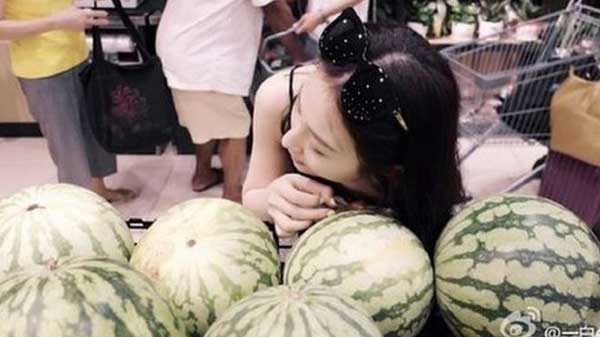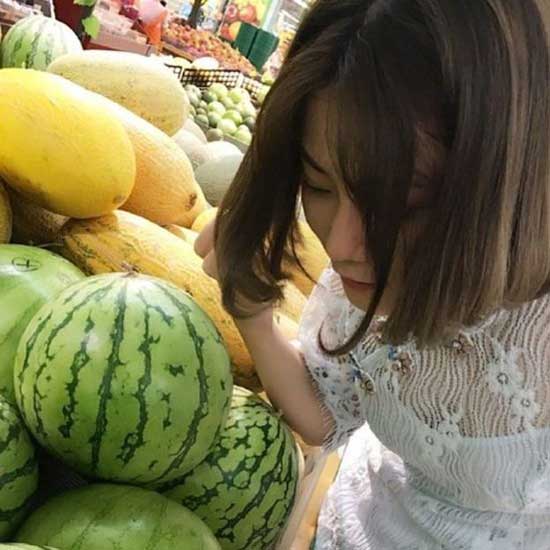當(dāng)前位置: Language Tips> 雙語新聞
The international language of watermelon knocking
分享到

The humble watermelon. The epitome of summer. But how do you know if it's perfectly ripe? Well, one theory is that if you knock hard on the outside, the sound you hear will help determine if it's ready to eat.
其貌不揚(yáng)的西瓜象征著夏季。但你怎么確定西瓜是否熟透?有種理論是,用力敲敲西瓜皮,聽聽聲音,這能幫你確定它們是否完全熟了。
That theory lead to a huge online debate in China about what kind of people engaged in the art of 'watermelon knocking'?
這種做法近期在中國(guó)的網(wǎng)絡(luò)上引發(fā)熱議,大家爭(zhēng)相討論哪些人愛“敲西瓜”。
The discussion, which thousands of people contributed to on the Chinese micro blogging site Sina Weibo, was kicked off by an obscure event thousands of miles away in Italy.
數(shù)千人參與了新浪微博上的這次大討論,而引發(fā)這次討論的是遙遠(yuǎn)的意大利的一件小事。
It all began when a Chinese social media user posted the picture below of a sign in an Italian supermarket asking customers not to knock on the watermelons. The sign was stuck in a crate full of watermelons which read: "please stop knocking on the watermelons, they will not respond to it!"
一位中國(guó)社交網(wǎng)站用戶發(fā)布了下面這張照片,照片上,這家意大利超市掛出一則標(biāo)識(shí),要求顧客不要敲西瓜。這則標(biāo)識(shí)插在裝滿西瓜的板條箱里,其上寫道:“請(qǐng)不要再敲西瓜了,西瓜不會(huì)回應(yīng)你。”

There is no indication that the supermarket was targeting this message at customers with Chinese heritage. The sign was in Italian not Mandarin. But somehow it was taken as an attack on a practice which some Chinese observers regarded as being unique to their national customs.
沒有跡象表明超市掛出這則標(biāo)識(shí)是針對(duì)中國(guó)顧客。標(biāo)識(shí)是用意大利語寫的,而不是漢語普通話。但不知為何這被當(dāng)成了對(duì)敲西瓜這種行為的攻擊,而一些中國(guó)評(píng)論者認(rèn)為敲西瓜是中國(guó)人獨(dú)有的習(xí)慣。
According to What's On Weibo, the photo was widely shared after Chinese media outlets reported that the notice was aimed directly at Chinese customers. But some social media users were quick to establish that the art of knocking watermelons is not exclusive to China and is in fact universal. The viral photo was originally posted by a user on Weibo who calls himself 'Isolated Guardian'. He is allegedly a Chinese man living in Milan. The photo has since been removed from his page.
根據(jù)微博上的信息,在中國(guó)媒體報(bào)道稱這則標(biāo)識(shí)針對(duì)的是中國(guó)顧客后,這張照片迅速火遍中國(guó)網(wǎng)絡(luò)。但一些社交媒體用戶很快發(fā)現(xiàn)敲西瓜并非中國(guó)獨(dú)有的現(xiàn)象,其實(shí)在全球都非常普遍。最初上傳這張照片的是一位名為@孤島守護(hù)者的微博網(wǎng)友,據(jù)說是一位居住在米蘭的中國(guó)人。后來他將照片在其個(gè)人主頁刪除。
Many shared jokes aimed at the supermarket sign.
很多網(wǎng)友分享了有關(guān)這則超市標(biāo)識(shí)的笑話。
Some people shared photos of themselves listening for a response from watermelons.
一些人分享了自己聽西瓜“回應(yīng)”的照片。

The topic of watermelons is another example of how some people in China are concerned about how they are perceived around the world.
敲西瓜這一熱門話題是一些中國(guó)人關(guān)心外國(guó)人如何看待他們的又一例證。
Online users are keen to show they know better, especially on the subject of watermelons.
網(wǎng)友們熱衷于表現(xiàn)出自己知道的更多,特別是關(guān)于西瓜這件事。
Others pointed out that the concept of watermelon knocking has been passed down from their parents.
還有人指出敲西瓜是爸爸媽媽傳下來的方法。
A quick online search will reveal that Chinese social media users are not alone in their thinking. Watermelon knocking and listening for a hollow sound is indeed a near universal concept. A vast array of videos and blogs provide with advice on how to pick a good watermelon. It even appears in film and animation. Popular Russian cartoon, 'Nu, pogodi!' included watermelon knocking as part of an episode.
在網(wǎng)上快速搜索一下就會(huì)發(fā)現(xiàn),不僅僅是中國(guó)的社交媒體用戶這樣想。敲西瓜、聽回聲其實(shí)是一種普遍現(xiàn)象。有很多視頻和博客都給大家提供了如何挑選好吃的西瓜的建議。敲西瓜這種行為甚至還出現(xiàn)在電影和動(dòng)畫片里。流行的俄語卡通片《兔子,等著瞧!》中也有敲西瓜的情節(jié)。

One video comically claimed to have a magic formula but the end result was not very convincing. There's even a smart phone app designed by Chinese university students to you help you in your endeavour to find the ideal watermelon.
一段視頻中滑稽地說,有個(gè)挑選好西瓜的魔法公式,但其結(jié)論并沒那么有說服力。幾位中國(guó)大學(xué)生還發(fā)明了一個(gè)幫人挑選好西瓜的智能手機(jī)應(yīng)用。
There are no absolute guarantees about what to do when it comes to choosing fruit. But at the risk of causing an international diplomatic incident we would suggest there some common ground about what to look for to choose the perfect watermelon.
在挑選水果的時(shí)候,沒有什么萬全之策。但冒著引發(fā)國(guó)際外交事件的風(fēng)險(xiǎn),我們給您提幾條關(guān)于挑選好西瓜的建議。
Feel the weight of the melon. The heavier the better
感受一下西瓜有多重,越重越好。
Press on the watermelon. It should feel firm and if it springs back, it's ready to eat
在西瓜皮上按一按,應(yīng)該很硬實(shí),如果按下去后能恢復(fù)原狀,就熟透了。
Look at the markings on the melon. A yellow patch on one end indicates it's ready
看下西瓜上的條帶。如果一端發(fā)黃就是熟了。
Of course if that all that fails, you could always, knock and wait for a reply.
當(dāng)然如果這些都沒用,你就可以敲敲西瓜,等它回應(yīng)。
英文來源:BBC
翻譯&編審:yaning
上一篇 : 入職前應(yīng)當(dāng)問清的10個(gè)問題
下一篇 : 讓人不想再去的旅游城市曝光
分享到
關(guān)注和訂閱


關(guān)于我們 | 聯(lián)系方式 | 招聘信息
電話:8610-84883645
傳真:8610-84883500
Email: languagetips@chinadaily.com.cn